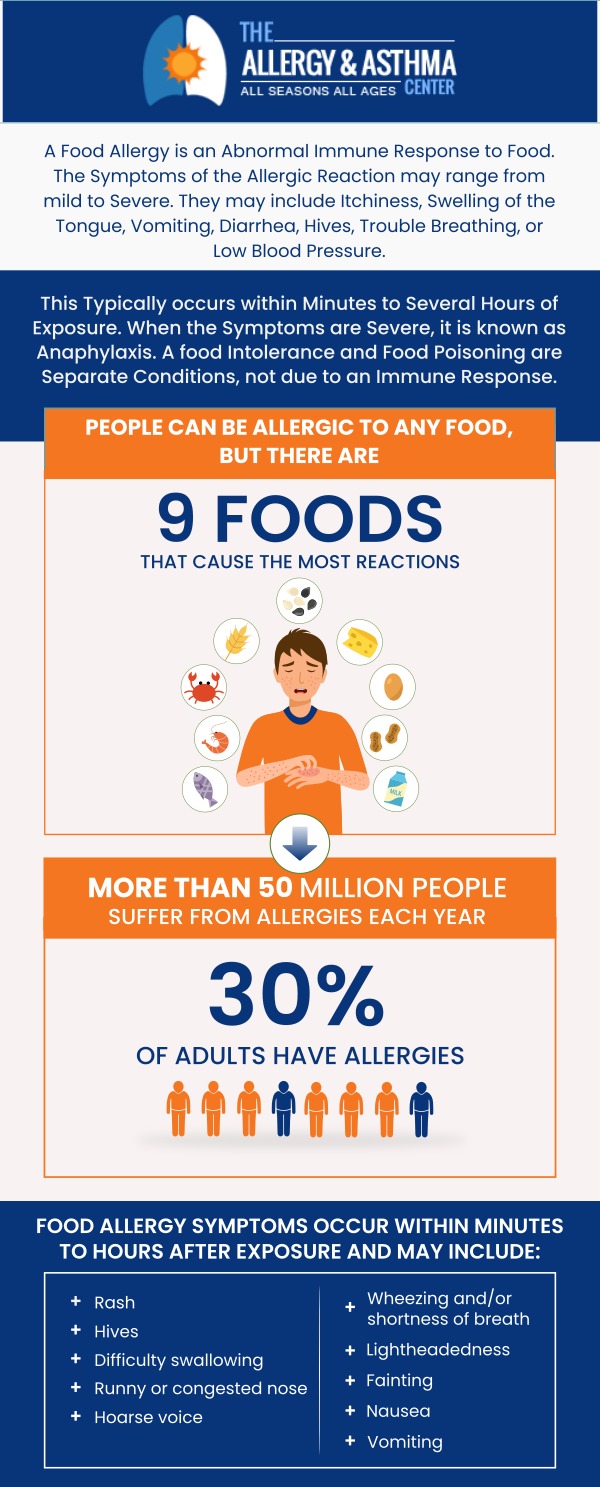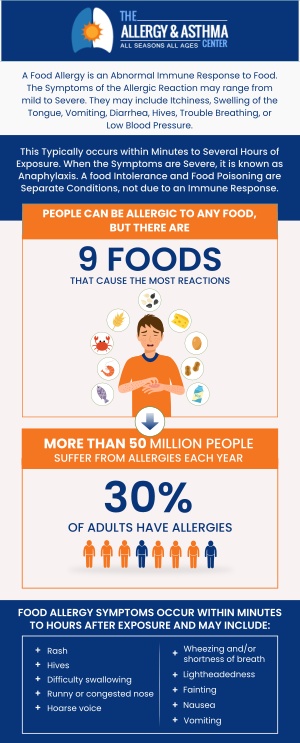Food Allergies in Children Q&A
Identifying food allergies in children can help you know which foods for them to avoid to prevent unwanted symptoms and potentially serious complications. Allergy & Asthma Center can diagnose food allergies in children. For more information, please contact us or book an appointment online. We have convenient locations to serve you in Lawrenceville GA, Atlanta GA, and Conyers, GA.




Table of Contents:
How do I know if my child is allergic to a certain food?
What are the signs and symptoms of a food allergy?
What are the most common food allergies experienced by children?
Can a child suddenly develop a food allergy?
How do you test kids for food allergies?
There is no guarantee that your child has a food allergy just because he or she reacts to a particular food. Certain foods may cause food intolerance in some kids. Food allergies involve the child’s immune system, whereas food intolerances usually affect the digestive system. More people suffer from food intolerance than food allergies.
An allergy to a food is more dangerous than an intolerance to another food. It is usually necessary for the child to avoid the offending food completely. There is usually no serious consequence to food intolerance. Small amounts of the substance may be safe for the child to eat.
The best way to know for sure if your child has a food allergy is to bring them in for testing at the Allergy & Asthma Center.
Histamine is released in the body as a result of an allergic reaction triggered by the immune system. There are different levels of severity associated with allergic reactions. It is possible for someone to have a severe reaction to a food regardless of the severity of their previous reactions.
Typically, symptoms of a food allergy include trouble breathing, wheezing, coughing, throat tightness, and hoarseness. Belly aching, diarrhea, vomiting, hives, swelling, and red spots may also accompany a food allergy. Other signs include itchy, swollen, or watery eyes and a potential drop in blood pressure that can result in lightheadedness.
Occasionally, allergies can cause severe reactions called anaphylaxis. The symptoms of anaphylaxis can be similar to those of a less severe reaction, but can quickly worsen. There is a possibility that the person may have trouble breathing or pass out. It is possible that more than one part of the body is affected. Anaphylaxis can be fatal if it isn’t treated with injectable epinephrine.
Allergies to eggs, milk, peanuts, wheat, soy, and tree nuts are the most common causes of food allergies in children. The most severe allergic reactions among children are caused by nuts, peanuts, tree nuts, shellfish, and fish. Allergies to food affect nearly 5 percent of children under the age of five.
Children with food allergies must have been exposed to the food at least once before reacting, or they may have been sensitized through breast milk. Your child begins to experience allergic symptoms after eating the food for the second time. As a result of the reaction between IgE antibodies and the food, histamines are released, causing hives, asthma, itching in the mouth, breathing problems, stomach pains, and vomiting in your child. So, while a child can develop a food allergy suddenly, it cannot occur during the initial exposure to food.
When a child needs to be tested for food allergies, they should visit an allergist such as Dr. Jon E. Stahlman, MD and staff at the Allergy & Asthma Center. They may order a skin test or a blood test to check for food allergies.
A skin test involves pricking your child’s forearm or back with liquid extracts of food allergens, checking for reddish raised spots (called wheals), and waiting. Having a positive food test suggests your child might be sensitive to the food in question.
Tests for IgE antibodies against specific foods are performed on the blood to confirm food allergies.
The doctor may conduct a food challenge if previous tests are unclear, in which the person is given increasing amounts of the possible allergen to eat while being monitored for symptoms. As a life-threatening reaction could occur, the test should be conducted in a hospital or allergist’s office.
Allergy & Asthma Center can diagnose food allergies in children. Visit our clinic conveniently. We serve patients from Lawrenceville GA, Atlanta GA, Conyers GA, Suwanee GA, Duluth GA, Grayson GA, Decatur GA, Brookhaven GA, Lithonia GA, and Covington GA.

Additional Allergy & Asthma Services
▸ Allergy Shots
▸ Allergy Testing
▸ Asthma
▸ Bronchodilators
▸ Drug Allergy
▸ Food Allergy
▸ Insect Allergy
▸ Nasal/Sinus Allergies
▸ Pediatric Allergy
▸ Pediatric Asthma
▸ Skin Allergy
▸ Spring Allergies




